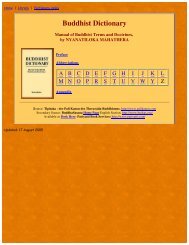The Three Basic Facts of Existence II: Suffering (Dukkha) - Buddhist ...
The Three Basic Facts of Existence II: Suffering (Dukkha) - Buddhist ...
The Three Basic Facts of Existence II: Suffering (Dukkha) - Buddhist ...
- No tags were found...
You also want an ePaper? Increase the reach of your titles
YUMPU automatically turns print PDFs into web optimized ePapers that Google loves.
specific and general characteristics, <strong>of</strong> Dhammas other than this is the highest form <strong>of</strong> pleasure,<strong>of</strong> which it is said “Whenever a man comprehends the categories rise and fall, he finds therehappiness and bliss: that knowledge is <strong>of</strong> deathlessness.” 89 <strong>The</strong> “non-knowledge” should beunderstood in the opposite sense; for abiding in confusion is suffering. An alternativeexplanation is that “knowledge” means the knowledge’s actual presence (sabhâva); for theneutral (subjective conascent) feeling associated with the knowledge, and that which is theknowledge’s supporting object (which the knowledge <strong>of</strong> neutral feeling is considering), ispleasant in its agreeable mode, according as it is called “agreeable and giving agreeable fruit.““Non-knowledge” can then be understood in the opposite sense.” 90Pleasure as gratification or as relief from pain is real while it lasts“Were there no gratification in the case <strong>of</strong> the eye (etc.), creatures would not lust in connectionwith the eye: it is because there is gratification in the case <strong>of</strong> the eye (etc.), that creatures lust inconnection with the eye (etc.). Were there no inadequacy in the case <strong>of</strong> the eye, creatures wouldnot become dispassionate (disgusted) in connection with the eye … Were there no escape in thecase <strong>of</strong> the eye, creatures would not find an escape in connection with the eye …” 91 “It is anypleasure or joy (somanassa) that arises dependent on feeling that is the gratification in the case <strong>of</strong>feeling. That this feeling is impermanent, suffering, and subject to change is the inadequacy(danger) in the case <strong>of</strong> feeling. <strong>The</strong> disciplining and abandoning <strong>of</strong> desire and lust for feeling isthe escape in the case <strong>of</strong> feeling.” 92 But neutral feeling is ignored while the pleasureaccompanying knowledge is lacking, and so “the untaught ordinary man understands noescape from unpleasant feeling other than sensual pleasure (kāma-sukha).” 93<strong>The</strong> impermanence <strong>of</strong> all feeling makes it impossible to find any enduring refuge from theundesirable unpleasant feeling within the range <strong>of</strong> feeling, and so ultimately “pleasant feelinghas to be seen as suffering, unpleasant feeling as a dart, and neutral feeling as impermanent;” 94for “while three kinds <strong>of</strong> feeling have been stated by me, namely, pleasant, unpleasant, andneutral, still it has been also said by me that ’Whatever is felt, all comes under suffering.’ That,however, was spoken by me with reference to the impermanence <strong>of</strong> formations.” 95Now, while “Gratification in the case <strong>of</strong> feeling is, in its highest aspect, freedom fromaffliction,” 96 nevertheless, since feeling <strong>of</strong> some sort accompanies all experience whatever as one<strong>of</strong> its necessary components, if that freedom is to be lasting it has to be sought not in feeling, noteven in formations, which are inseparable from feeling, but rather in the exhaustion <strong>of</strong> craving(taṇhākkhaya) and the stilling <strong>of</strong> all formations (sabbasaṅkhārasamatha). And just as the onlookingequanimity<strong>of</strong> the fourth jhāna is called a “pleasant abiding” 97 so too Nibbāna (extinction <strong>of</strong>craving) is called the “ultimate pleasure.” 98 While “suffering” is thus extended beyond feeling toall that is formed (saṅkhata), “pleasure” in the highest mode—that “beyond spiritual bliss”(nirāmisā nirāmisataraṃ sukhaṃ)—is withdrawn from the formed, including feeling, and equatedwith the unformed (asaṅkhata), which is Nibbāna. “<strong>The</strong> Blessed One describes pleasure withreference not only to pleasant feeling; rather, friends, a Tathāgata describes as pleasure any kind89Dhp-a 25:16/V 374.90Þìká ad MN 44/M <strong>II</strong> 294–5.91SN 35:17/S IV 10.92SN 36:15/S IV 220.93SN 36:6/S IV 208.94SN 36:5/S IV 207.95SN 36:11/S IV 216.96MN 13/M I 90.97MN 8/M I 41.98MN 74/M I 508.45
















